AFL Players’ Association’s Insight and Impact report highlights AFLW players facility concerns
AFLW players have hit out at poor playing surfaces and facilities at a number of venues, as players call for the league to bridge the gap between the male and female players.
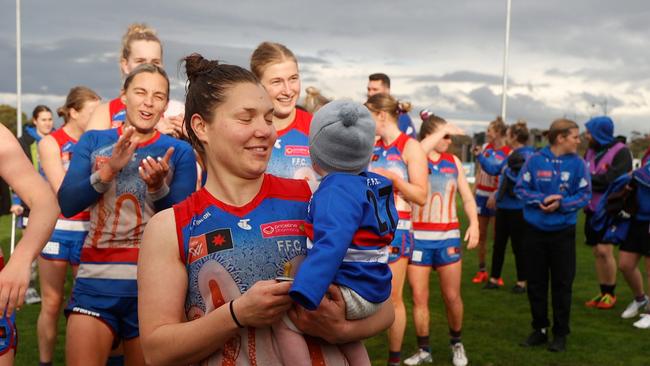
AFLW players have slammed the poor playing surface and facilities at six venues — but are poised for a win with Box Hill City Oval set to be scrapped when the league releases the fixture for the upcoming season.
According to the AFL Players’ Association’s Insight and Impact report players ranked Box Hill as the worst surface in the country and player feedback is likely to have contributed to the decision to abandon the ground.
Clubs have been given a draft copy of the AFLW fixture, which includes games at Sydney’s Henson Park — rated the poorest for facilities last season as it was infested with cockroaches — but not Box Hill.
Henson Park is set for a major upgrade that should bring it up to scratch.
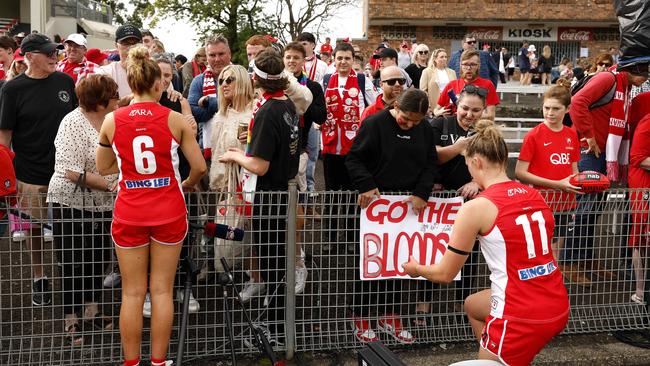
The AFL will use 26 venues next season — down from 33 — in a move welcomed by the AFLPA.
“There are a number of planned improvements to both surfaces and facilities for this season,” AFLPA boss Paul Marsh said on Monday.
“We’ve got good detail from the AFL on that. We’ll go have a look at the venues before the matches are played this year.
“The players would love to play more games (at Marvel Stadium), but they understand the competition has strong community roots.
“We want to make sure there’s a good mix.”
Adelaide’s Wigan Oval, WA’s Fremantle Oval and Mineral Resources Park and Punt Rd were the other AFLW venues that disappointed players last season.
The six substandard grounds hosted 30 per cent of home-and-away matches last season.
Geelong’s GMHBA Stadium, St Kilda’s Moorabbin base and Gold Coast’s Heritage Bank Stadium were clearly ranked as the best by players.
“Shouldn’t we expect minimum standards in our workplace that are reflective of the highest level of a national competition?” Giant Chloe Dalton said.
“If we’re to become the professional competition we all want to see, it’s time to get serious and bridge the gap between the best and worst (venues).”
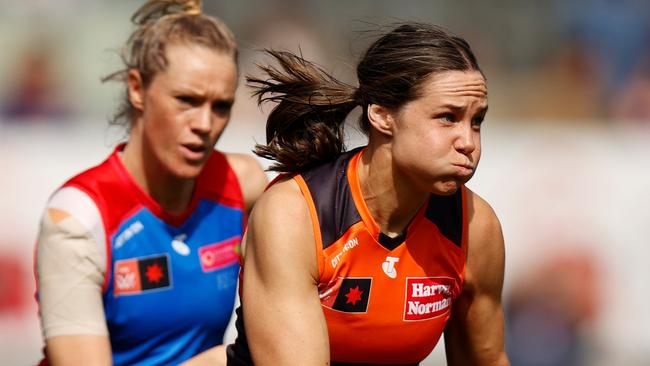
INTEGRATION
The majority of AFLW players do not believe their football program has been “completed integrated” into their club.
While 61 per cent of players from expansion clubs Essendon, Hawthorn, Port Adelaide and Sydney were happy, just 27 per cent of players from the existing 14 clubs felt their programs had been fully integrated.
Head coaches at Essendon (Natalie Wood), Hawthorn (Bec Goddard) and Port Adelaide (Lauren Arnell) have crossover roles in the men’s football department.
The AFLPA wants more AFLW senior and assistant coaches to crossover to help prioritise integration.
“We are committed to ensuring both our men’s and women’s athletes receive equal opportunities,” Swans boss Tom Harley said.
“The competition is evolving and while the AFLW has found its groove within the broader game, growth must continue.
“The industry needs to attract and retain the best and the brightest, on and off the field, to ensure the women’s competition continues to progress and our female athletes have the support they need to thrive.
“Continual investment – personal, professional and financial – into our AFLW programs is vital in creating a one-club environment.”
The AFLPA is also using Collective Bargaining Negotiations to seek a doctor and physio contracted for the same hours per week as players and available at training.
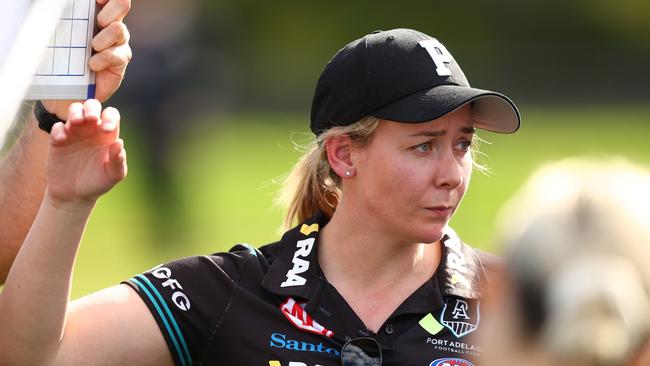
TRANSITION
An inaugural Carlton AFLW player has hit out at the way the Blues delisted her and said the transition process for exiting athletes “needs a lot of work”.
“I got told by my player agent on the way to a club function towards the end of the season that my time was up,” Alison Downie said.
“It would’ve been nice to be part of that conversation. My experience wouldn’t be unique.
“When you’re on the inside, things are great. There’s a lot of talk of values, being people-focused and how appreciated you are to the place – until you’re not and then you’re reduced to a number, which was eye-opening and confronting.
“It’s a brutal industry. I was lucky in some respects. I didn’t earn big dollars and my life outside of sport was already established.
“I can imagine a world, though, where that extra layer abruptly ends along with your sporting career.
“The way the football industry handles players exiting the game needs a lot of work.
“It needs open and honest communication, but I know there are difficulties involved with that. Relationships are on the line and feelings can get hurt but, as a former athlete, I know they’ll appreciate the honesty as decisions are being worked through.”
Downie played 39 games for the Blues and 20 for Collingwood. She said the Magpies “handled that exit better” last year.
“But the transition experience for an athlete greatly influences how they remember their time in the game. What do we want that lasting impact to be?” she said.
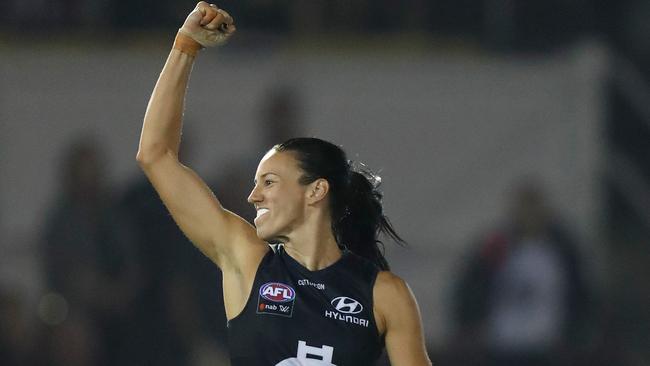
League steadfast as players cry out for AFLW season expansion
- Jon Ralph
The AFL is determined to free the AFLW fixture from its collective bargaining talks with the player union and link the length of seasons to key metrics on the growth of the women’s game.
As part of a significant brand overhaul after seven seasons the AFL has ambitious plans to improve the match day experience and lift the standard of games with rule changes that should lead to higher scoring.
The AFL and player union are still locked in delicate talks over the length of the upcoming season, which will start in 10 weeks on September 1.
But while players want a 12-week season — and a rise to 17 games as early as 2026 under a fully-professional league — the Herald Sun understands the AFL is keen to consolidate its growth with a 10-game season before another significant expansion.
Under the league’s proposal the competition’s expansion would be linked to key metrics including attendances and TV audiences.
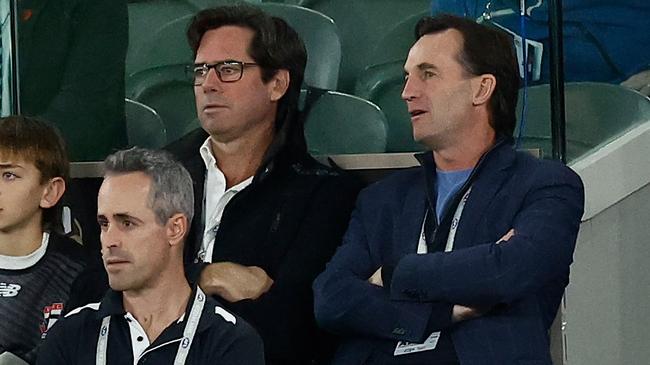
Those metrics would govern how quickly the competition expanded to 12 and 14 games.
The AFL is concerned about a downturn in AFLW attendances and TV ratings.
Average attendances have dropped from 6405 in season one (2017) to just 2507 per game in season seven — a 60 per cent decline.
Average TV attendances are down 70 per cent from the initial eight-team competition where four games a week were broadcast to the current 18-team competition, where nine games a week are televised.
The league last year expanded from 14 to 18 teams, and has gone from 29 to 99 games in its first seven seasons, with 540 AFLW players now taking part compared to 240 in season one.
The AFL is determined to grow the women’s code in the next decade but is keen to do so from a position of strength.
The AFLPA believes expanding the game to at least 12 games this year will help improve standards with more regular competition.
An early bargaining position in CBA talks saw the league asking for 10-game seasons through the life of a potential nine-year CBA, but the AFL is keen to eventually expand the season length.
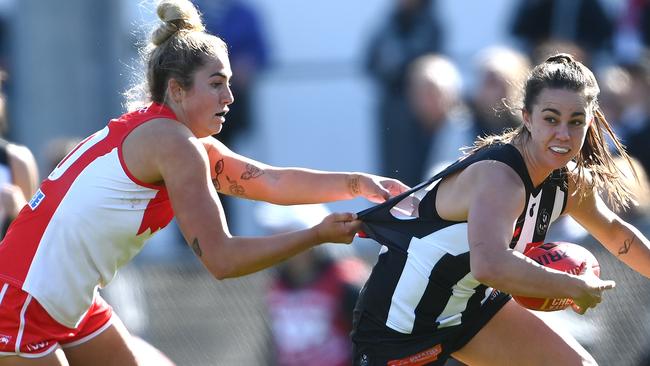
The league has committed to rule changes that will incentivise scoring and ball movement without leading to blowouts between the competition’s heavyweights and second-season sides.
Some teams made 80 interchanges a game in contests much shorter than the men’s competition, with the league to restrict the use of runners and extend quarter lengths by two minutes.
Quarter lengths would grow from 15 minutes and time on to at least 17 minutes plus time on, with interchange capped at a maximum of 55 per game.
That consistent match day experience will see the league using only 26 official venues this year – down from 39 last year – to ensure AFLW players play on elite surfaces with stadiums that fit the demand for spectators.
An expansion to 12 games would see the league forced to start the season before its preferred September 1 date – in the pre-finals AFL bye – or pushing the grand final back into mid-December when cricket takes over the sporting calendar.





To join the conversation, please log in. Don't have an account? Register
Join the conversation, you are commenting as Logout